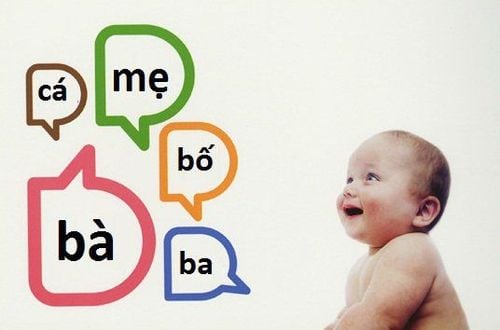This is an automatically translated article.
The article was consulted with Master, Doctor Nguyen Thi An - Pediatrician - Neonatologist - Department of Pediatrics - Neonatology - Vinmec Ha Long International General Hospital.Before they can actually speak their native language or learn another language, babies will babble, whisper, and play with sounds. The process of learning to speak for all children, as well as the way to teach them to speak is almost the same around the world.
1. Children's speech milestones
Babies start "conversing" for the first time right after birth, and it's nonverbal language. Babies often wince, cry, and squirm to express a range of emotions and needs, from fear and hunger to frustration or feelings of overload. Parents should actively learn to listen and understand each different cry (guessing what the baby means through the cry) of what the child is trying to express.The key milestones of baby learning to speak appear during the first 3 years of life - when the brain is developing rapidly. When you hear your baby's first words depends on each child's unique skills.
3 months old At 3 months, your baby will listen to your voice and watch your face when you talk. They also turn their heads toward the voices, sounds, and music that can be heard around the house. Many babies prefer women's voices to men's, and some babies like the voices and songs they heard in the womb. At about 4 months, babies begin to "bow" a cheerful, soft voice, and repeat a certain tune over and over.
6 months old Entering 6 months, baby starts babbling with different sounds. For example, your child might say "ba-ba" or "da-da." By the end of 6-7 months, babies can respond to being called by their own name, recognize their native language, and use voice to express feelings of happiness or sadness. Many parents are eager to interpret some of the sounds their children are babbling, for example, “ma-ma” is the word “mom”. However, babbling babies at this age often make random words out of simple syllables that don't make sense or really understand.
9 months old After 9 months, your baby can understand a few basic words like "no" and "goodbye". Babies may also begin to produce a wider range of sounds and tones.

18 months old Babies this age will say some simple words and can point to people, objects, and body parts to name them. She also repeats words or sounds she hears from you, such as the last word in a sentence. But babies often don't say a word clearly, for example the word "give" for "dog" when they learn to say the names of animals, or "bestow" for "cake". From 20 months of age onwards is also the time when parents can let their baby practice speaking English or another second language.

3 Years Old By age 3, your baby's vocabulary will expand rapidly. The "pretend" games promoted understanding of sign language and abstractions such as "now/now", sensations such as "sad" and spatial concepts such as "in", "out" ".
Trắc nghiệm: Sự phát triển tinh thần, vận động của bé thế nào là đúng chuẩn?
Khi nào bé biết nói, biết hóng chuyện hay biết cầm cốc là "đúng chuẩn"? Điểm xem bạn biết được bao nhiêu mốc phát triển tinh thần, vận động "đúng chuẩn" của bé nhé!The following content is prepared under supervision of Thạc sĩ, Bác sĩ y khoa, Ma Văn Thấm , Nhi , Phòng khám Đa khoa Quốc tế Vinmec Dương Đông(Phú Quốc)
2. Teach children to practice speaking
Children can understand what you say long before they speak the words clearly. Many children learn to speak at first using only 1-2 words, by this time they actually understand about 25 words or more.You can teach your baby to talk by:
Observe Babies often raise their arms to say “want to be held”, hand you a toy to say “let’s play” or push food off the plate to say "full". At those times, parents should smile, look at their baby, and respond to encourage this initial attempt at nonverbal communication.
Listen Pay attention to your baby's babbling and babbling, and respond with similar sounds and words. Babies are trying to imitate the sounds their parents make, while changing the pitch and timbre to match the language they hear around them. So be patient and give your baby plenty of time to practice talking to you.
Praise Smile and praise all the smallest or most confusing efforts as your baby learns to speak . Children will learn the power of words through the reactions of the adults around them.

Encourage your baby to talk If your baby points at the table and makes noises, don't just tacitly and quietly hand him the cake or candy. Instead, point to the cake and say, "Do you want more cake? These cheesecakes are delicious, aren't they?"
Narrative Talk about what you're doing when you're doing laundry, changing clothes, bathing, and feeding your baby. For example, "You're going to wear this blue shirt today" or "I'm chopping up chicken for you to eat". This helps children connect what they hear from you to the objects and experiences going on around them.

Let your baby lead While you are playing with your baby, follow your child's wishes and interests. This helps children see that communication needs to be two-way talking and listening, one person leads and the other follows.
Play Encourage children to play, pretend to be characters and say what's on their mind to develop verbal skills at the toddler stage.
Read aloud Young children are the ones who love reading stories the most. Reading aloud to children the right picture book will bring many enjoyable experiences and feelings of relaxation.
Parents can update the necessary knowledge when teaching their children to speak through the following article: Teaching children to practice speaking: Knowledge to know.

3. When the child is slow to speak
Speech delay can happen for a number of different reasons. Diagnosing a speech problem early will give you more time to correct and help your child reach his or her full potential before school age. You can consult your pediatrician about what to do to help your child with a speech delay such as:Hearing Tests Up to 3/1,000 newborns have congenital hearing loss, and this can lead to speech retardation. Most hospitals will screen a baby for hearing soon after birth. If your child has failed to pass the initial hearing screening, parents should take the child for an intensive hearing test before 3 months of age.
See pediatric specialists They can diagnose and treat speech, language or speech disorders that delay your baby's speech. Parents will receive tips and hands-on guidance with games to improve their child's speech and language skills.
Monitor General Development Up to 17% of children in the United States have a developmental or behavioral disability, such as autism spectrum disorder or intellectual disability. Parents can review and consult a doctor to screen for developmental problems, which may be related to speech delays, for their child.

In general, when the baby learns to speak, parents should actively encourage the child by whispering, babbling, talking and singing often with the baby. Don't forget to always give your child a positive response and show interest in what he has to say. These are the most basic and perfect foundations for teaching children to speak.
To help children reach important developmental milestones. In addition to the nutritional diet, parents should supplement their children with supporting products containing lysine, essential micro-minerals and vitamins such as zinc, chromium, selenium, and B vitamins to help fully meet their nutritional needs. in children. At the same time, these essential vitamins also support digestion, enhance nutrient absorption, help improve anorexia, help children eat well, and develop comprehensively.
Please regularly visit Vinmec.com website and update useful information to take care of your baby and family.
Reference source: webmd.com














